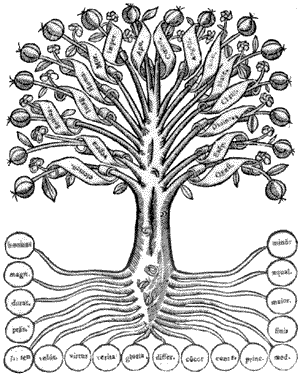Given that the nature and availability of a concept in a tradition cannot be separated from the words by which the concept is expressed in that tradition, I shall begin with a few remarks about the use of the Sanskrit terms that express the notion of consciousness. The Sanskrit word for consciousness is cit; in more modern languages, for example, in Hindi and Bengali, it is caitanya. Two other terms worth noting in this context are ‘jñāna’ and ‘vijñāna’. In earlier philosophical literature, especially the Upaniṣads, both terms have been used synonymously with consciousness (although in different senses in later systematic writings). In this introduction, I shall not go into the nuances of the meanings of these terms as reflected in their textual usages, a task that I intend to undertake in the individual chapters of this work. Suffice it to say that in this book, I shall use cit for consciousness and jñāna for specific cognitions.
Vijñāna, as the etymology suggests, would then be a special kind of jñāna, although the Buddhists use this term, particularly a variant of it—vijñapti—for all cognitions. It is worth noting that some philosophers, especially the Naiyāyikas, have used the word ‘buddhi’ as synonymous to both cit and jñāna, while others have regarded buddhi as a special faculty of comprehension. In any case, consciousness and knowledge are both distinguished from manas (generally translated as ‘mind’), which has been construed, as the inner sense (antahkarana) in the Indian systems of philosophy. It is worth noting that neither Western philosophy nor Western psychology makes a clear distinction between ‘mind’, ‘intellect’, and ‘consciousness’. They generally use ‘mind’ and ‘consciousness’ synonymously, and construe ‘intellect’ as an intellectual faculty, better yet, activity of the mind. Among Western philosophers, Kant’s distinction between the inner sense, intellect, and consciousness roughly approximates the distinction between ‘manas’, ‘buddhi’, and ‘cit’ found in the Indian context. Kant argues that whereas all mental representations belong to the inner sense, the faculty of intellect conceptualizes, and consciousness objectifies the raw materials of knowledge.
Given that a cognitive state is also a state of consciousness, it will be imperative that in my discussion, I carefully distinguish between questions of knowledge and questions of consciousness. The former, in a more specific sense of jñāna, belongs to the theory of knowledge or epistemology, and falls under the purview of pramānaśāstra. For the latter, that is, cit or consciousness, there seems to have been no specific branch of philosophy. In Indian philosophy, either cit is identical with the self or ātman, or else the ātman is reducible to a stream of consciousness. In any case, cit finds its place among the proper themes of metaphysics.
To offer a remark or two about the use of corresponding terms in Western languages—the English word ‘consciousness’ has no equivalent in Greek. As a matter of fact, it is widely held that the Greeks did not have a fully developed concept of consciousness and the Greek language does not have a suitable word for it. The origin of the word goes back (6) perhaps to the Roman ‘conscience’, meaning ‘the inner voice’. One interesting feature of the word ‘consciousness’ is the occurrence of the suffix ‘-ness’, which seems to suggest an abstract noun or the property ‘of being conscious’. The Sanskrit word does not have that sense, unless one uses the word ‘caitanya’. The German ‘Bewusstsein’ ends with the suffix ‘sein’, which does not have the same meaning as the English suffix ‘ness’ (which in German would be ‘heit’ or ‘keit’). Sein rather means ‘being’, thus Bewusstsein would seem to mean ‘being conscious’. On the further implications of the contrast I shall not make any remark for the present.
Before proceeding, it is worth noting that the word ‘consciousness’ has often been used among philosophers and psychologists in any of three different meanings. In the widest sense, it is used to stand for all mental states, cognitive, affective, and conative. In this sense, perceptions, thinking or thoughts, feelings such as pleasure and pain, emotions such as happiness, love, sadness, hopes and desires are all states of consciousness. In a narrower sense, which many philosophers have preferred, only cognitive states are states of consciousness. In this sense, one would regard pleasure and pain, hopes and desires as not states of consciousness, but at best as possible objects of one’s cognition or knowledge and so objects of consciousness. In the third, perhaps, the most restricted sense, one regards consciousness as what should be called self-consciousness, that means not the primary cognitive states but one’s awareness of these states. When we go through different theories of consciousness in Indian philosophy, we will notice how these three senses are being used in different systems.
